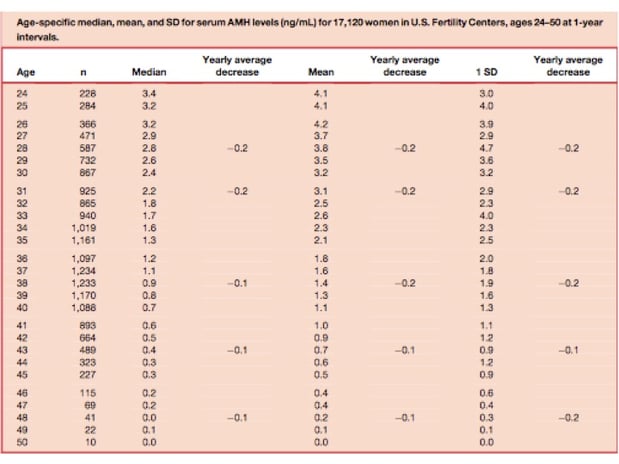
 Anti-mullerian hormone (AMH) is a useful measure of the follicular supply in a woman. It is generally accepted that as a woman ages, the follicular supply decreases and AMH levels decrease. Blood (serum) AMH levels correlate to antral follicle count (AFC) and are more accurate than age and other routinely used blood tests (FSH, Estradiol, inhibin B) in predicting the ovarian response to fertility drugs.
Anti-mullerian hormone (AMH) is a useful measure of the follicular supply in a woman. It is generally accepted that as a woman ages, the follicular supply decreases and AMH levels decrease. Blood (serum) AMH levels correlate to antral follicle count (AFC) and are more accurate than age and other routinely used blood tests (FSH, Estradiol, inhibin B) in predicting the ovarian response to fertility drugs.
The impact of age on AHM levels was addressed in a study by Seifer, et al, reported in Fertility and Sterility. They analyzed blood samples from 17,120 women of reproductive age (24 – 50 y). All bloods were tested in a single reference laboratory (ReproSource, Inc., Woburn, MA) using materials from Beckman Coulter-DSL (Chaska, MN). This is an important variable as the numbers can change if a different assay kit is used.
They reported the numbers mean (average) as well as median (midpoint, middle number of the group when they are ranked in order):

Both media and mean AMH values decreased steadily with increasing age from 24 to 50 years of age. The average yearly decrease in the median AMH value was 0.2ng/mL/year through age 35 and then diminished 0.1 ng/mL/year after age 35. The rate of decline in mean AMH values was 0.2 ng/mL/year through age 40 and then diminished to 0.1ng/mL/year thereafter.
Median values were lower than mean values (data were not normally distributed). Median values are a helpful reference point as they identify the AMH value below which lies exactly half the population.
For each year, there was a wide variation in AMH values. This continues to support the concept that AMH values reflect follicular supply independent of age.
Evaluation of ovarian reserve is a key fertility test for women. A comprehensive approach to testing includes a combination of age, FSH, E2, AFC, AMH, patient weight and previous ovarian response to fertility drugs.
To see a fertility specialist who is a board-certified physician with excellent success rates, make an appointment at one of InVia’s four Chicago area fertility clinics .
Infertility Infertility treatment Diminished ovarian reserve Ovulation Induction

Entire Website © 2003 - 2020
Karande and Associates d/b/a InVia
Fertility Specialists
